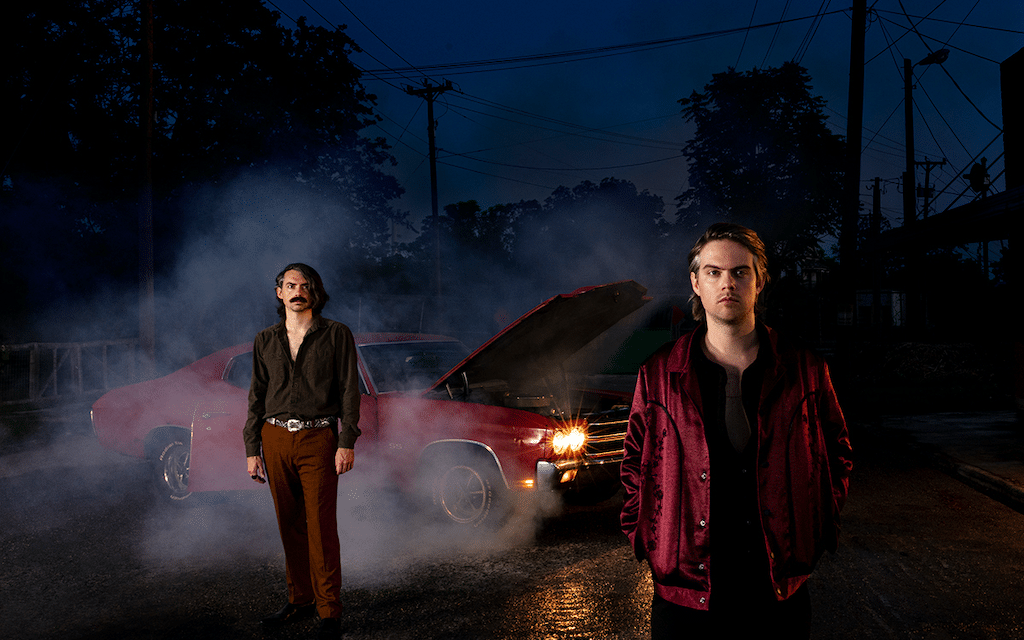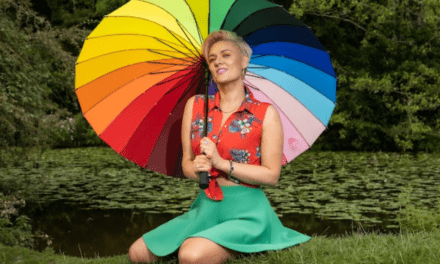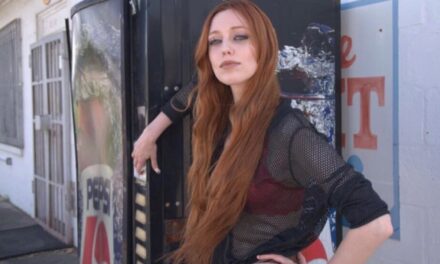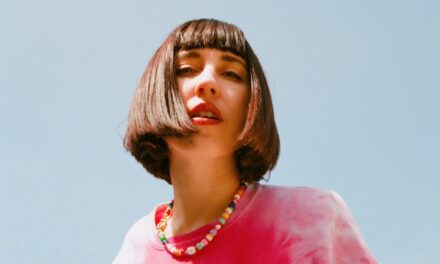The Holy Knives is composed of brothers Kody and Kyle Valentine, born and raised in New Orleans and now living in Los Angeles. The Holy Knives have toured extensively over the past few years, playing 125+ shows across the United States and Canada.
Last year, they released two EPs including a remix by Jamie Hince of The Kills. Currently, they are working on a new album as well as forthcoming singles. The next song to be released, Born to Die, was produced by Ian Hultquist (Passion Pit) and will be released August 20th.
Tell us about the genesis of your project. How did you get to where you are now?
Kyle and I are brothers and have been making music together since we were young. We’ve formed a lot of different bands over the years with different styles and sounds, but it all was leading to where we are now. Growing up together, we’ve shared a lot of similar experiences and our music tastes have evolved in similar ways so that helps us when we are working toward finding a sound that we think is really true to who we are. We value the idea of creating our own unique atmosphere or world above almost anything else when making music, so that collective experience has really helped us hone in on that world-building aspect.
What does music and being an artist mean to you?
Music is everything to us. It’s a decoration of time itself and a prayer to moments and feelings. Music has always been something that has inexplicably and constantly moved me. There is something so powerful about it that is hard to quantify but really easy to experience.
Being an artist is something that I believe in and love because it is both an individual and a collective journey of self-discovery at the same time. Exploring who I am and who we are—past, present, and future—through the artistic process and music is one of the most rewarding things I’ve experienced and I can’t imagine spending my time on earth in other ways (at least for now).
What are some sources of inspiration for your lyrics and storytelling?
Inspiration for lyrics and storytelling often starts from a very personal place for me. I find that I’m always starting with an emotion that I’ve experienced or am experiencing and I let that feeling be the guiding light throughout writing the song. Sometimes the inspiration can be an instrumental idea that Kyle has come up with and I’ll let the feeling that it sparks in me be the centerpiece for the rest of the lyrics. I’m always trying to get more in touch with myself and my emotions so that I can more readily understand how to express what I am truly feeling more accurately, which feels like a never-ending problem. Recently, Kyle and I have worked more collaboratively on polishing the lyrics and centering the lyrical message, which played a large part in shaping the lyrics for Born to Die.
Who is an artist that you look up to more than others today?
James Blake is the first name that comes to mind. His music is a big inspiration on what we do. He is an artist that is truly unique and blends electronic elements with incredible musicality which makes his music so interesting. I think he’s really pushing the boundaries on what popular music can be and making some truly timeless art.
All time favorite record?
One of our all-time favorite records and a record that has had a huge influence on this project is Portishead’s self-titled record. It is one of the best examples of an album that creates its own world from the very first moment it starts ‘til the end. Portishead was so meticulous in building their own sound and innovating in their own ways and I think that’s one of the reasons we love them so much.
Tell us about your latest release and how it came about
The song started in late-pandemic isolation days when I found myself turning more and more to the internet for social connection. I realized eventually that it was not comforting at all and was in fact more isolating and sometimes pretty menacing—and Born to Die started with that feeling in mind. There were a lot of dark things being spread on social media like false information, conspiracy theories, hate, anger, and fear, and seeing that stuff day after day is mentally taxing. It really sometimes felt easy to lose faith in people. More lives happening around you, more ideas, more thoughts doesn’t necessarily breed connection, it can often just make you feel more lonely, and to me, that kind of idea of a vibrant, bustling place that could be welcoming but instead turning hostile and derelict is represented in the cityscapes in movies like Bladerunner and Taxi Driver, which Kyle and I watched kind of back to back before making the song, so we drew on those visual inspirations heavily when imagining what we wanted the song sound like.
The song started from the off-kilter arpeggio we dialed on our ARP 2600 that you hear in the intro, and to me, I instantly felt that connection to a lot of these ideas of technological isolation I had been thinking on and experiencing. We started as we often do with me (Kody) improvising vocals over the instrumental and the first lines of the song “walking through the city streets, city lights, I see your eyes in the walls” came out right away because the instrumental was so powerful to me in evoking that kind of atmosphere. From there, we reached out to Ian Hultquist because we’re big fans of his scoring work. Together we all worked to build a noir-ish atmosphere with electronic drums, synths, and live strings. The lyrics are about loving the fact that everything ends, but that fact is what gives it all meaning.
You seem to be fusing several musical genres. What inspires your sound?
A lot of film scores, movies, and other music. As I’ve said we really strive to build an atmosphere that is distinct in each song we write, so I think we take a lot of cues from the imagery in film and TV and try to translate that into sound. It often comes down to the feeling we are trying to create and remembering a time we felt that or something that made us feel that way and trying to understand why and going from there. Cliff Martinez’s scores and artists like Portishead, Leonard Cohen, James Blake, and Nick Cave are really big inspirations for us.
What are some things you do to deal with anxiety and creative blocks?
Our approach to creative blocks is to generally just keep creating. We are a bit boring in that regard because we just try to work on music every day no matter what comes of it. A lot of times it’s pure shit, but I think pushing through those blocks and trying to create as often as possible is what works for us and has helped with some of my own self doubt. Dealing with anxiety is much more delicate and can be very debilitating. It helps being a duo because we can often rely on each other to help overcome feelings of anxiety or doubt.
Where do you see yourself in 5 years?
Hopefully, everywhere.
Your style is very original and elaborate. How do you take care of your aesthetics?
Being uncompromising when it comes to vision. Visuals have become for better or for worse a large part of how people consume music in 2021, so understanding that and realizing it is an extension of the music has been important to us.
What was the most daunting moment in your career so far?
Probably all of the times that we played to near-empty rooms on tour when we were first starting out. In those moments I feel like I questioned every life choice that led me to that moment and it was a whole existential whirlwind up there. But it’s always a part of growth and, in my opinion, every experience helps shape who you are, so I don’t think I can say I regret it.
What is the best advice you’ve ever gotten?
The best advice I’ve gotten came from a friend who told us that we needed to write a lot more songs to learn how to write the best songs that you can. For any given song we work on, there are generally at least 10 other ideas that didn’t make the cut before getting to the final version of any song. We really believe in this style of songwriting and have been working on it for a few years now and I think it’s truly helped us grow as writers and artists.
Where do you think the next game changer will be in the music industry and entertainment scene?
I think that something will have to give in regards to streaming payouts and that the biggest gamechanger will be when someone finds a more sustainable way to compensate artists for their work. Not exactly sure how or when that will come, but I think it will and hope it does.





